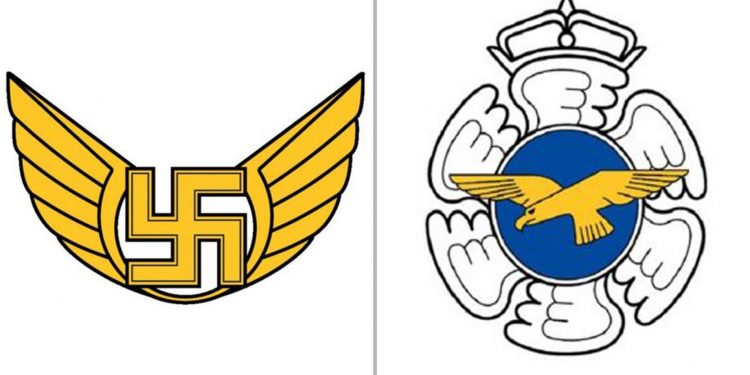Finland’s air force, which for over a century has had a Swastika as part of its emblem, has replaced the controversial Nazi-linked symbol with a golden eagle, the military said Thursday.
The decision to remove the emblem was actually made in 2017, but it has taken time to roll out the change and only received widespread attention this week when a Helsinki professor spotted the change.
According to the air force, the new emblem with a golden eagle has been its official logo since 2002 but some units and aircraft kept the one featuring a swastika, which was the official logo from 1918-1945.
Since 1945, Finnish military aircraft have featured a white-blue-white roundel as the national insignia but the swastika remained in some unit emblems, unit flags and decorations.
“This is something that we’ve had to explain for foreigners who connect it to Nazi Germany, even though it has a completely different background,” military press officer Henrik Gahmberg told AFP.
While the swastika in modern times is associated with Nazi Germany, the symbol, and variants of it, has been used in Hinduism and several other Indo-European religions since ancient times.
Finland’s air force adopted the symbol after the Swedish count Eric von Rosen donated a plane, which had his good luck charm — a blue swastika — painted on the wings, to the newly independent Finland in 1918.
Before then Finland was under Russian rule.
“The swastika has also been part of Finnish mythology, so it was natural to use it,” Gahmberg said.
The change has been rolled out quietly without the air force communicating it but it received media attention after Teivo Teivainen, a professor of World Politics at the University of Helsinki, tweeted about it on June 30.
While the Finnish air force’s adoption predates the Nazis’ use of the symbol, von Rosen did have a connection to the Nazis as he was the brother-in-law of Hermann Goring — future supremo of the German air force.
During World War II, Finland also fought alongside the Axis powers against the Soviet Union, but in 1944 it also fought against Germany in the Lapland War.










